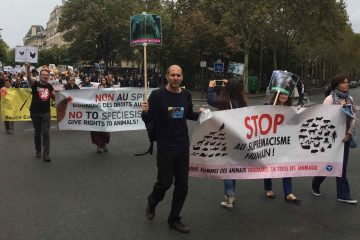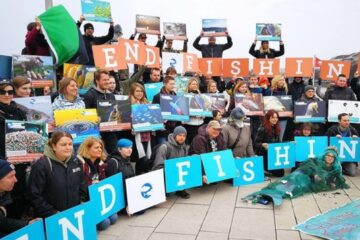* *
*
Various practical recommendations and recipes have occasionally been published in these pages [in Les Cahiers antispécistes in years 1991-1993] for dishes that are not only vegetarian (without meat or fish), but also vegan (no milk or eggs either, or any animal products). Our aim has been to show that there are now ways to replace products obtained at the cost of animal suffering – and in particular eggs, since the great majority of those that can be found today come from battery farms, where hens suffer one of the cruellest forms of exploitation.
However, this rose has its thorn, too. By speaking of veganism and not simply of vegetarianism, we give the impression of seeking ‘purity’. Several people have told us that after reading the Cahiers antispécistes they decided ‘to go further’, as in further than vegetarianism, and to become vegan. All well and good, but ‘going further’ can also translate into other actions, such as forming an activist group, organizing the distribution of flyers or a conference, sticking posters up, contacting the press, organizing a demonstration or other spectacular actions, thinking about arguments to use in debates (which is the raison d’être of the Cahiers antispécistes!), asking a bookshop to stock animal-rights literature, writing such literature yourself… There is a broad variety of actions of this type that you can do in order to ‘go further’. We have suggested a few types of action in these pages, and there are plenty of other ideas to come up with.
One of the key lines of action of the animal rights movement is that it is not a simple matter of private, ‘personal morals’ but implies political commitments relating not only to yourself but also to others, in line with commitments galvanising other rights movements, both past and present. When I hear the phrase ‘going further’ in simple terms of personal purity (diet, clothing, etc.), I have the feeling that even though in absolute terms it is better to eliminate up to the last milligram of animal product – which today is almost always the products of suffering – devoting so much energy to it, especially when there are so few animal rights activists and when each of our neighbours uses animal products by the kilo, amounts to retreating into our private spheres and, to a certain extent, giving up the fight.
I am not strictly vegan. It would certainly be better in absolute terms if I changed the brand of margarine I use to one that does not contain whey (‘lactoserum’), if I systematically refused to eat milk chocolate, if I made more effort to do without the medicine that I take when I am ill, which is all tested on animals (and contains gelatine and other additives of animal origin), if I sold my woollen jumpers, and so on. My hands are not squeaky clean, but I also think that none of the animals who die every day in slaughterhouses do not care about how clean my hands are.
In our society, nothing is more banalized than exploiting animals; it’s everywhere. English vegan magazines have spilt a lot of ink discussing the expression ‘cruelty-free’. For purists, ‘cruelty-free means cruelty-free’. For instance, not only must real vegans not wear wool, they must also not eat Kellogg’s cornflakes because they are fortified with vitamin D produced from lanolin (fat extracted from sheep’s wool or from the layer of fat under the animals’ skin). Obviously, it is only 0.000003% of the overall ingredients, ‘but that is not the problem’ because ‘supporting a company that, like Kellogg’s, insists on using an animal source seems a very strange thing for a vegan to do’ (letter from a reader to Vegan Views n° 54, p. 11). In other sources, you can read that white sugar should be prohibited because it is bleached using animal charcoal, as should wine, which contains blood and extracts from fish. In another issue of Vegan Views it is mentioned (albeit with irony!) that even mirrors contain animal byproducts and that true vegans therefore do not allow their reflections to show up on them.
The formalism of the criteria is striking. Honey is prohibited because it is an animal product but sugar is acceptable (aside from the issue mentioned above) despite the fact that insects are killed when cane is grown and harvested. A soy dessert coloured using cochineal (extracted from crushed insects) is rejected but we should not hesitate to drive miles to buy another more vegan brand. Insects crushed on the way do not count because they are not ingested – nobody is polluting our bodies (i.e. our stomachs; if an insect flies into our mouth we can always spit her out!). It seems that more importance is placed on the micrograms of vitamin D derived from lanolin in Kellogg’s cornflakes than on the tonnes of meat that, like everyone, the workers at the Kellogg’s factory eat, and yet it is also our money that pays for what they eat.
There are no ‘cruelty-free2’ products: there are only products that involve different levels of cruelty (not only cruelty to animals: some products result from exploiting humans). However, I do not think, either, that our aim must be to use only products ‘involving the least possible level of cruelty’. If we wanted to be ‘as pure as possible’ we would not use photos because of the gelatine in the films. We could not make posters because of the printing films and perhaps also the ink. It would become much more difficult to be an activist. Even stamps are suspect (isn’t the gum on the back of animal origin?). But we have to make choices, taking other criteria into account too, and it is not always easy.
If those who opposed slavery in 19th-century America had wanted be ‘pure’ or ‘as pure as possible’ they would have had to give up wearing most of their cotton clothing. They would have had to travel as little as possible in order not to use roads built by slaves. However for us it is obvious that they were right to oppose slavery in this way rather than retreating into paralysing purism.
It is the purely personal nature of purism that bothers me most. Of course our fight requires each of us to make a personal commitment: meat-eaters who claim to be animal rights activists are like slave-owners claiming to oppose slavery. However, although personal, this commitment should not be towards oneself but towards opposing animal exploitation, both by not financing the exploitation and through what this opposition brings to light. Eating meat is perhaps first and foremost a signal that one wants animal exploitation to continue. Meat cannot be produced without killing animals. Riding a bicycle with a leather saddle, on the other hand, has no such signalling value. The saddle happens to be leather but could well be made of anything else. The same applies, in part, to eating eggs or drinking milk: we can imagine obtaining these products without causing suffering and without killing – even though it is not what actually happens.3
Purity may nevertheless have advantages. It is paradoxically sometimes easier to make ‘absolute’ decisions in order to avoid finding oneself on the slippery slope of temptation (since deciding something once and for all can be easier than weighing the pros and cons every time). Purity can also be a way to demonstrate the possibility of avoiding any animal exploitation – so strong is the desire of some of our opponents to believe that it is only because we continue to consume even minuscule quantities of animal products that we are still alive.4 It also increases the number of occasions on which we have to explain our opposition to animal exploitation (which is why I sometimes prefer not to turn down a dish containing milk or eggs!). Finally, it means that we are participating even less in this exploitation.
However, in saying this, I do not want to introduce the idea that there is a need for ‘reverse purity’; that a ‘good antispeciesist’ must necessarily be impure. I think that it is up to each of us to decide how far to go in this respect, without looking down on those who are less pure and without fearing the contempt of those who are more pure. The essential step, in my opinion, is to stop eating meat; some people in certain situations may need courage to take this step.
Another problem is that of medication. Unfortunately, I do not really believe in the effectiveness of most ‘alternative’ medicines, which are supposed to involve less animal testing, and in particular homeopathy.5 Herbal medicine is fundamentally neither gentler on humans nor less tested on animals than conventional medicine. Its only advantage is that it generally only involves products that have been known for a long time (and therefore are no longer tested) and that it provides less income to pharmaceutical companies that test on animals. However, it offers only a limited range of products.
That doesn’t mean that I am opposed to the use of unconventional treatments. Conventional medicine is often synonymous with violence, including towards the humans being treated with it. Complementary medicines sometimes have the advantage of encouraging patients to observe themselves, to take the time to reclaim back responsibility for their own bodies and to be less passive when their bodies don’t function properly. In my case, it would no doubt do me a lot of good to take that time and it is no doubt mainly out of laziness that I don’t. But I reject the idea that if one supports animal rights, one must automatically believe in the effectiveness of homeopathy, iridology and other alternatives. I also reject the idea that a vegetarian must only eat organic food, give up smoking and drinking and so on. Smoking is bad for your health whether you support animal rights or not. The choices that we make for health reasons have nothing to do with animal rights.
Françoise Blanchon co-founded the French-speaking theoretical and activist magazine Les Cahiers antispécistes in 1991. She then became an activist in feminist, lesbian and queer circles.
Credit Photo: Jo-Anne McArthur / We Animals Media
Notes:
- This article by Françoise Blanchon is the translation of the French paper “Au sujet de la « pureté »” originally published in Les Cahiers antispécistes issue no. 7 (June 1993). Translated by the Linguistic Pole of Projet Méduses. Many thanks to the translators and the proofreaders. It was also translated into Portuguese by Jean Pascal Rouvrais (reviewed by Marly Prestes) and was published in Les Cahiers antispécistes, under the title “Sobre o tema da « pureza »”.
- Moreover, the term ‘cruelty-free’ also has the disadvantage of putting more stress on the psychological attitude that cruelty represents than on the suffering of animals.
- It is because of this symbolic value in particular that we stress the importance of using non-animal sources of vitamin B12.
- However, unless vegan from birth even the purest vegans can always be accused of ‘living off their (animal) reserves’.
- In addition, it is highly unclear in what cases homoeopathy has been tested on animals, at least during the research stage, since research is based on observing the effects of high doses of substances.


